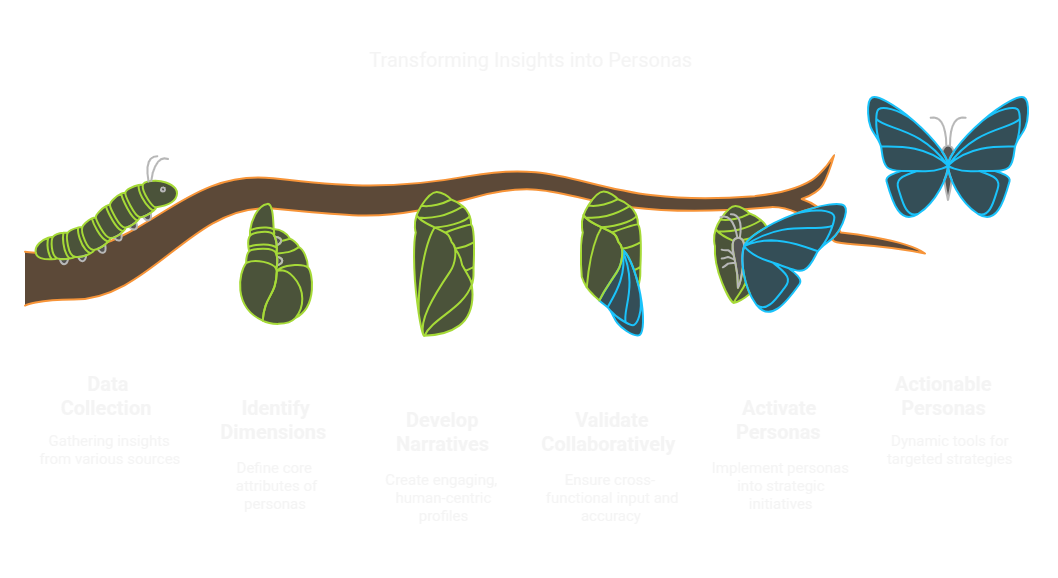Customer Personas for Go-to-Market: A Strategic Blueprint for B2B Success
What if your go-to-market strategy was missing a critical piece of the puzzle? Recent research reveals that 71% of B2B companies struggle to develop meaningful customer personas that truly drive strategic decision-making.
Marketing and insights professionals know the challenge all too well: creating customer personas that move beyond surface-level demographics and capture the nuanced motivations, challenges, and decision-making processes of potential buyers. Without precise, actionable customer insights, teams find themselves spinning their wheels—developing messaging that fails to resonate, targeting strategies that miss the mark, and product positioning that lacks genuine connection.
Developing robust customer personas isn't just a theoretical exercise—it's a strategic imperative that can transform how organizations understand, engage, and ultimately convert their most valuable prospects. This guide will walk you through a comprehensive blueprint for crafting customer personas that don't just describe your audience, but provide a living, breathing framework for more intelligent go-to-market execution.
Understanding the Basics of Customer Personas in B2B Go-to-Market Strategy
At its core, a customer persona is a detailed, semi-fictional representation of your ideal customer that goes far beyond basic demographic information. Think of it as a comprehensive profile that captures the intricate landscape of a potential buyer's professional challenges, motivations, decision-making processes, and organizational dynamics.
Unlike generic market segments, a well-crafted customer persona reveals the human element behind business decisions. It answers critical questions: What keeps your potential customer up at night? What professional goals are they trying to achieve? What obstacles stand in their way of success?
Why Customer Personas Matter in B2B Contexts
For marketing and insights professionals, customer personas are more than a theoretical construct—they're a strategic tool that directly impacts business performance. Precise personas enable:
- Targeted Messaging: Crafting communication that speaks directly to specific professional pain points
- Product Development: Aligning product features with genuine customer needs
- Sales Enablement: Providing teams with deeper insights into buyer psychology and decision triggers
- Resource Optimization: Focusing marketing and sales efforts on the most promising prospect segments
By transforming abstract market data into rich, actionable narratives, customer personas bridge the gap between raw information and strategic understanding. They provide the nuanced insights that separate effective go-to-market strategies from generic, ineffective approaches.
Why Customer Personas Matter for Your Business
For B2B companies and SMBs, customer personas aren't just a marketing trend—they're a strategic necessity that can fundamentally transform how you approach market engagement, product development, and revenue generation.
Strategic Benefits of Robust Customer Personas
-
Enhanced Market Penetration
By precisely understanding your ideal customer's professional landscape, you can identify untapped market segments and develop laser-focused strategies that cut through competitive noise. This means more efficient lead generation and higher conversion rates.
-
Improved Product-Market Fit
Customer personas provide deep insights into genuine market needs, enabling product teams to develop solutions that directly address specific professional challenges. The result? Products that resonate more strongly and solve real problems.
-
More Effective Resource Allocation
When you understand exactly who your most valuable customers are, you can strategically focus marketing budgets, sales efforts, and development resources on the most promising prospect segments.
-
Accelerated Sales Cycles
Detailed personas help sales teams craft more personalized pitches, anticipate objections, and speak directly to the specific pain points of decision-makers. This targeted approach can significantly reduce friction in the sales process.
Common Persona Development Pitfalls to Avoid
Despite their potential, many businesses stumble when creating customer personas. Watch out for these critical mistakes:
- Relying solely on demographic data without capturing deeper motivational insights
- Creating static personas that aren't regularly updated with market intelligence
- Developing personas in isolation, without cross-functional input from sales, product, and customer success teams
- Treating personas as theoretical exercises instead of actionable strategic tools
Successful B2B organizations recognize that customer personas are living documents—dynamic frameworks that evolve with market shifts and organizational learning. By treating them as strategic assets, companies can unlock more precise, resonant go-to-market approaches.
Building Effective Customer Personas: A Strategic 5-Step Framework

Transforming market insights into actionable customer personas requires a methodical, comprehensive approach. This step-by-step framework will guide marketing and insights professionals through creating personas that drive meaningful go-to-market strategies.
Step 1: Comprehensive Data Collection
The foundation of any powerful customer persona is rigorous, multi-source research.
- Research Methods:
- Conduct in-depth customer interviews
- Analyze sales call transcripts
- Review customer support interactions
- Leverage existing CRM and analytics data
Pro Tip: Use a mix of quantitative and qualitative data sources to ensure a holistic view of your customer landscape.
Avoid: Relying exclusively on internal data or making assumptions without direct customer input.
Step 2: Identify Core Persona Dimensions
Move beyond basic demographics to capture the complex professional ecosystem of your ideal customer.
- Key Persona Dimensions:
- Professional Role and Responsibilities
- Primary Business Challenges
- Decision-Making Authority
- Technology and Tool Preferences
- Career Objectives
- Organizational Constraints
Pro Tip: Create a standardized template that ensures consistent persona documentation across your organization.
Avoid: Focusing only on surface-level job titles without understanding deeper professional motivations.
Step 3: Develop Narrative Personas
Transform raw data into compelling, human-centric profiles that reveal genuine insights.
- Narrative Construction Elements:
- Create a memorable name and background
- Detail specific professional challenges
- Outline typical decision-making processes
- Highlight emotional and rational drivers
Pro Tip: Use storytelling techniques to make personas memorable and shareable across teams.
Avoid: Creating personas that feel generic or lack genuine human complexity.
Step 4: Cross-Functional Validation
Ensure your personas reflect a comprehensive organizational understanding.
- Validation Process:
- Schedule collaborative workshops
- Gather input from sales, product, and customer success teams
- Cross-reference insights with actual customer interactions
- Iterate and refine based on collective expertise
Pro Tip: Create a feedback mechanism that allows continuous persona refinement.
Avoid: Developing personas in marketing isolation without broader organizational input.
Step 5: Activate and Integrate Personas
Transform personas from documentation to actionable strategic assets.
- Activation Strategies:
- Develop persona-specific messaging frameworks
- Create targeted content strategies
- Design personalized sales enablement materials
- Establish regular persona review and update cycles
Pro Tip: Use visualization and storytelling to make personas tangible across different organizational functions.
Avoid: Treating personas as static documents instead of dynamic strategic tools.
Essential Tools and Frameworks for Customer Persona Development
Transforming strategic insights into actionable customer personas requires the right combination of tools and proven frameworks. Marketing and insights professionals can leverage these resources to streamline persona creation and maximize their go-to-market effectiveness.
Recommended Tools for Persona Research and Development
-
UserInterviews.com
A comprehensive platform for recruiting research participants and conducting in-depth customer interviews. Ideal for gathering nuanced qualitative data that powers persona development.
-
Gong.io
AI-powered conversation intelligence platform that analyzes sales calls and customer interactions, providing deep insights into customer communication patterns and pain points.
-
Qualtrics CustomerXM
Advanced survey and feedback management tool that enables sophisticated market research and customer insight collection across multiple channels.
-
HubSpot Persona Generator
Free tool that helps marketing teams create structured customer personas with guided templates and strategic prompts.
-
Hotjar
Web analytics platform that provides heat mapping, user behavior tracking, and interaction insights to supplement persona research.
Strategic Frameworks for Persona Development
-
Jobs-to-Be-Done (JTBD) Framework
Shifts focus from demographic descriptions to understanding the fundamental problems customers are trying to solve. This framework helps create personas centered on practical customer motivations and desired outcomes.
-
Empathy Mapping
A visual approach that explores what customers think, feel, say, and do. Complements the narrative persona development by adding emotional and psychological dimensions to customer understanding.
-
Value Proposition Canvas
Provides a structured method for aligning persona insights with product features, ensuring that go-to-market strategies directly address customer needs and pain points.
-
DACI Decision-Making Framework
Helps map out organizational decision-making roles (Driver, Approver, Contributors, Informed), crucial for understanding complex B2B buying processes within customer personas.
Pro Tip: No single tool or framework is a complete solution. Combine multiple approaches to create a comprehensive, multi-dimensional view of your customer personas.
Avoid: Treating tools and frameworks as substitutes for genuine customer research and insights. They are enablers, not replacements, for deep customer understanding.
Conclusion: Empowering Go-to-Market Success Through Strategic Customer Personas
Developing robust customer personas is not a one-time exercise but a dynamic, iterative process that requires continuous refinement and deep organizational commitment. By integrating comprehensive research methodologies, leveraging advanced data analytics, and maintaining a holistic view of customer segments, marketing and insights professionals can transform customer personas from static documents into powerful strategic assets that drive precise go-to-market positioning. The most successful organizations view customer personas as living frameworks that evolve with market dynamics, technological shifts, and emerging customer preferences, enabling them to anticipate market needs, customize engagement strategies, and create compelling value propositions that resonate authentically with target audiences. Ultimately, mastering the art and science of customer persona development becomes a sustainable competitive advantage that bridges strategic insights with practical execution, empowering businesses to navigate complex market landscapes with precision and strategic intelligence.
